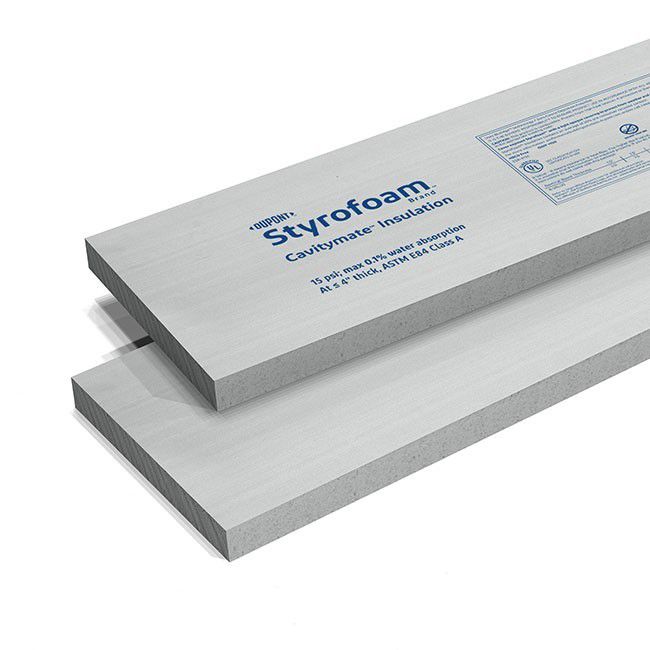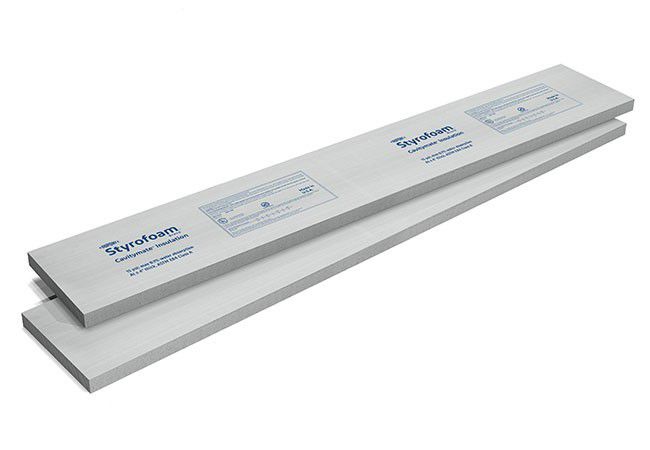DuPont™ Styrofoam™ Brand Cavitymate™ XPS Insulation
Durable, Moisture-Resistant, Cavity Wall Insulation Low-GWP Formulation


DuPont™ Styrofoam™ Brand Cavitymate™ XPS Insulation
Durable, Moisture-Resistant, Cavity Wall Insulation Low-GWP Formulation
Features & Benefits
Specifications
Standard Sizes
| Thickness | Width | Length | R-Value | Edge Treatment |
|---|---|---|---|---|
| 50 mm. | 400 mm. | 2400 mm. | 9.8 | Butt Edge |
| 75 mm. | 400 mm. | 2400 mm. | 14.8 | Butt Edge |
| 100 mm. | 400 mm. | 2400 mm. | 19.6 | Butt Edge |
Note: Please be advised that additional sizes may be available. Availability of all sizes varies by region and is subject to change. For further information, please contact your local DuPont Sales Representative or call us at 1-866-338-7668.
Testing
<b>Styrofoam™ Brand Cavitymate™ XPS Insulation</b> exhibits physical properties as indicated in the table below when tested as represented. Review all instructions and (Material) Safety Data Sheet ((M)SDS) before use. Please contact DuPont at 1-833-338-7668 when additional guidance is required for writing specifications that include this product.
| TEST METHOD | TEST TITLE | PROPERTY | RESULTS |
|---|---|---|---|
| FIRE | |||
| CAN/ULC-S102.2 | Standard Method of Test for Surface Burning Characteristics of Flooring, Floor Coverings, and Miscellaneous Materials and Assemblies | Surface Burning Characteristics | Flame Spread - 295 Smoke Developed - 635 |
| THERMAL | |||
| CAN/ULC-S770 | Standard Test Method for Determination of Long-Term Thermal Resistance of Closed-Cell Thermal Insulating Foams | Long-Term Thermal Resistance @ 23.8 °C (75°F) mean temp1 | 1.72 m2·°C/W |
| ASTM C5182 | Standard Test Method for Steady-State Thermal Transmission Properties by Means of the Heat Flow Meter Apparatus | Thermal Resistance per inch, @ 75°F mean temp. | 5.0 ft2•h•°F/Btu, R-value min. (0.88 RSI) |
| ASTM D696 | Standard Test Method for Coefficient of Linear Thermal Expansion of Plastics Between −30°C and + 30°C with a Vitreous Silica Dilatometer | Coefficient of Linear Thermal Expansion | 6.3 x 10-2mm/m• °C (3.5 x 10-5 in/in•°F) |
| ASTM D2126 | Standard Test Method for Response of Rigid Cellular Plastics to Thermal and Humid Aging | Change in Dimensions | 1.5 % linear change, max. |
| STRENGTH | |||
| ASTM D1621 | Standard Test Method for Compressive Properties of Rigid Cellular Plastics | Compressive Strength4 | 172 kPa (25 psi), min. |
| ASTM C203 | Standard Test Methods for Breaking Load and Flexural Properties of Block-Type Thermal Insulation | Flexural Strength | 303 kPa (44 psi), min. |
| WATER | |||
| ASTM D2842 | D2842-Test Method for Water Absorption of Rigid Cellular Plastics | Water Absorption | 1.9 % by volume, max. |
| ASTM E96 | Standard Test Methods for Gravimetric Determination of Water Vapor Transmission Rate of Materials | Water Vapor Permeance5 | 64 ng/Pa•s•m2 (1.2 perm), max. |
1Long-term predicted thermal resistance value for 50 mm thickness.
2Thermal values are consistent with the criteria of ASTM C578 and are not assessed by the CCMC. Depending on the product, a 15-, 30- or 50- year limited thermal warranty is available.
4Vertical compressive strength is measured at 10 percent deformation or at yield, whichever occurs first. Since Styrofoam™ Brand Extruded Polystyrene Foam Insulations are visco-elastic materials, adequate design safety factors should be used to prevent long-term creep and fatigue deformation. For static loads, 3:1 is suggested. For dynamic loads, 5:1 is suggested.
5Water vapor permeance varies with product type and thickness. Values are based on the desiccant method, and they apply to insulation 25.4 mm (1.0-inch) in thickness. Thicker products have lower permeance.

